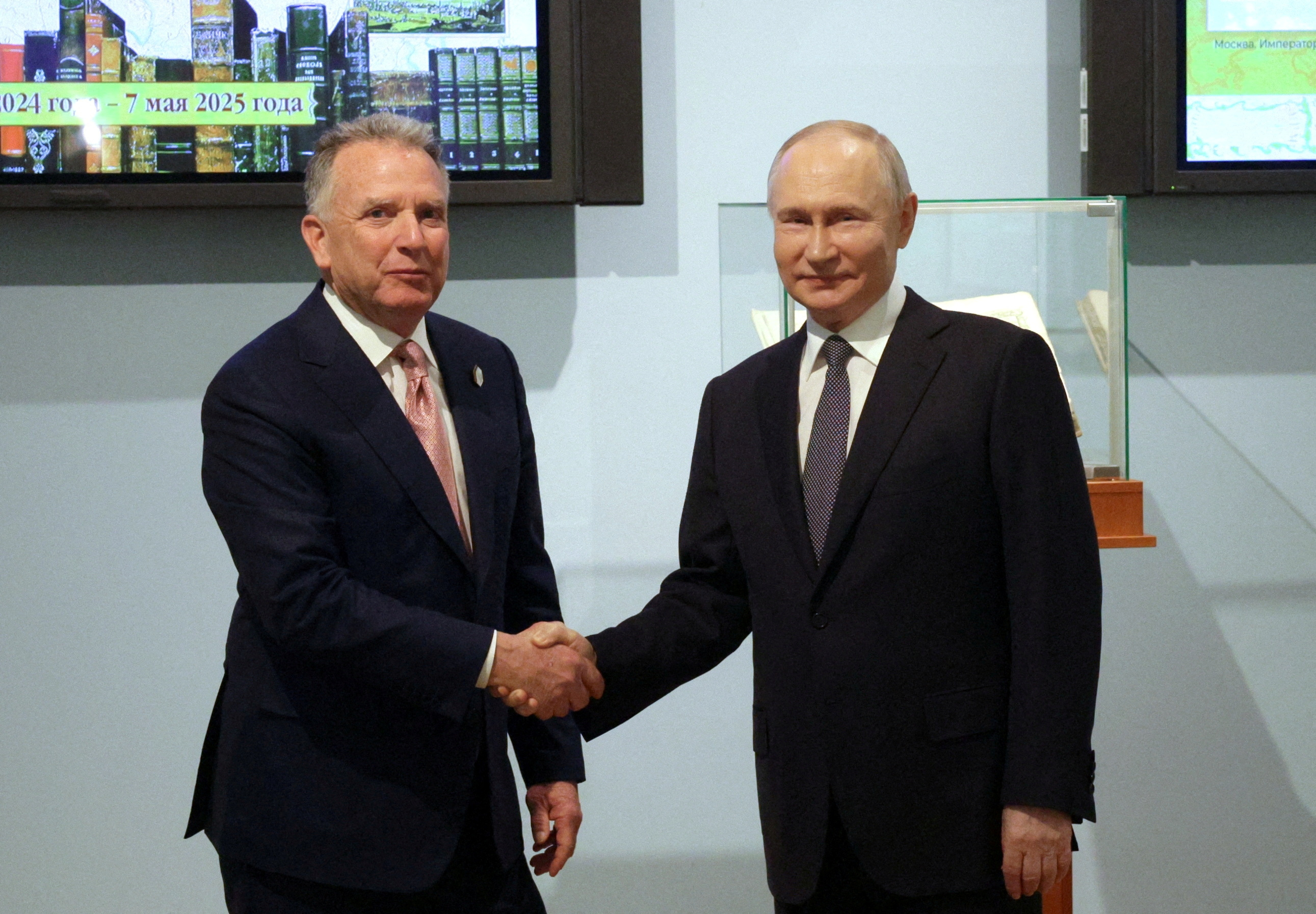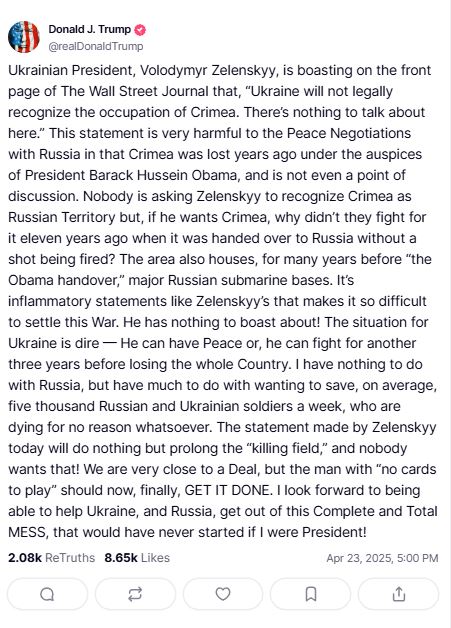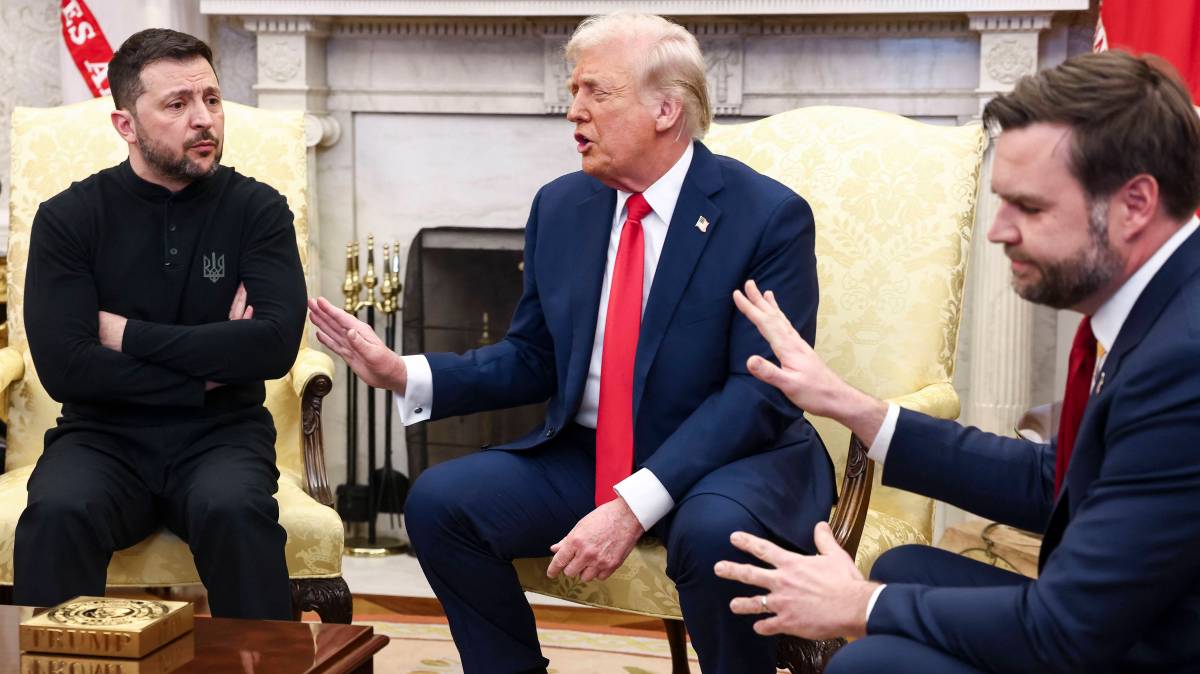Karoline Leavitt, the White House press secretary, has accused President Zelensky of “trying to litigate this peace negotiation in the press” following President Trump’s earlier attack on his Ukrainian counterpart.
Leavitt told reporters that the president’s “patience is running very thin” as he seeks to force through a peace accord, warning that Zelensky “seems to be moving in the wrong direction”.
She insisted that the Trump administration has not demanded that Ukraine formally abandon Crimea.
“The president is not asking Ukraine to recognise Crimea. Nobody has asked them to do that. What he is asking is for people to come to the negotiating table, recognising that this has been a brutal war for far too long,” Leavitt said.
“Unfortunately, President Zelensky has been trying to litigate this peace negotiation in the press, and that’s unacceptable to the president. These should be closed-door negotiations.”
Asked if Trump would walk away from negotiations if Zelensky did not bow to Washington’s demands by the end of the day, Leavitt said: “Not by the end of the day today, but the president has maintained that his frustration is growing and he needs to see this thing come to an end.”
Ukraine will ‘stand firm’ in peace talks
Ukraine will “stand firm on its core principles” in negotiations to reach a peace deal with Russia, Andriy Yermak, President Zelensky’s chief of staff, has said.
Yermak said he had conveyed to Keith Kellogg, the US special envoy, Ukraine’s position that an “immediate, full, and unconditional ceasefire” was the first step towards a “lasting peace”.
“We expressed hope that this aligns with President Trump’s vision,” Yermak said on X after their meeting in London on Wednesday.
“I stressed that under any circumstances, Ukraine will stand firm on its core principles during negotiations, as they are the foundation of our sovereignty and territorial integrity.”
Marco Rubio, the US secretary of state, pulled out of the talks after Ukraine reportedly insisted that they should focus on an initial 30-day ceasefire rather than Trump’s ultimatum.
Please enable cookies and other technologies to view this content. You can update your cookies preferences any time using privacy manager.
Enable cookiesAllow cookies onceWitkoff off to Moscow again
Steve Witkoff met President Putin earlier this month
SPUTNIK/GAVRIIL GRIGOROV/REUTERS
Steve Witkoff, President Trump’s special envoy, will travel to Moscow for a fresh round of peace talks with President Putin, according to the White House.
Witkoff, who has met Putin on three occasions in the Russian capital, has been accused by President Zelensky of “disseminating Russian narratives” about the three-year conflict.
After their previous meeting earlier this month, Witkoff said the US had “finally” received an answer from Putin about his demands for a permanent truce. These included Russia’s claims to occupied Ukrainian territories and not allowing Ukraine to join Nato.
The meeting is expected to take place on Friday, US officials told Axios.
Ukraine ‘wants war to end more than anyone’
Ukraine remains committed to working with the United States to end Russia’s three-year war, Andrii Sybiha, the foreign minister, said after talks with European and US representatives in London.
“During our meeting with US special envoy General Keith Kellogg we had a constructive exchange of views on the path to peace,” Sybiha said on X. “Ukraine wants the war to end more than anyone else in the world. We are committed to working together to achieve this goal.”
Sybiha did not directly address President Trump’s personal criticism of Ukraine’s President Zelensky earlier on Wednesday.
Referring to an earlier meeting with the UK, France and Germany, he added: “We reaffirmed Ukraine’s commitment to peace efforts led by US President Donald Trump and our willingness to move forward toward a comprehensive, just and lasting peace. We will continue our regular dialogue.”
Trump and Vance ‘don’t care about Ukraine’
The US administration’s stance on Ukraine is the “tip of the isolationist iceberg”, John Bolton, Donald Trump’s former national security adviser, has told Times Radio.
Speaking to John Pienaar, Bolton said: “I think that this is the mark of several things coming together. On Trump’s side, Vladimir Putin is his friend. He’s never been friends with Zelensky. He wants to continue to have good personal relations with Putin and therefore, in his mind, good relations with Russia.
“He thinks this is Biden’s war, and he wants it behind him. It’s all about Trump, pure and simple. He just doesn’t care about Ukraine.
“On Vance’s part, this man is an isolationist, and he doesn’t care what happens in Ukraine. He’s said this consistently going back to his 2022 senatorial campaign, even though Ohio, the state he comes from, has a large Ukrainian-American population. His unwillingness to do anything for Ukraine is clear, but it’s only the tip of the isolationist iceberg. That’s what’s at work here.”
Trump’s social media post in full Trump: Crimea was lost years ago
Trump: Crimea was lost years ago
President Trump has launched a scathing personal attack on President Zelensky, accusing him of “boasting” and saying Ukraine has “no cards to play” after Kyiv appeared to reject a US peace ultimatum.
The US president accused Zelensky of making “inflammatory” comments when he insisted Ukraine would never recognise Crimea as legally Russian.
In a post on Truth Social, Trump said Crimea was “lost years ago” and appeared to defend President Putin’s claims to the the Ukrainian peninsula, annexed by Russia in 2014, after the US submitted a peace proposal that would recognise Russia’s sovereignty of the region.
Trump said: “It’s inflammatory statements like Zelensky’s that makes it so difficult to settle this war. He has nothing to boast about!
“The situation for Ukraine is dire — he can have peace or he can fight for another three years before losing the whole country.”
Trump says peace deal ‘very close’ but warns Zelensky
A peace deal between Russia and Ukraine is “very close”, President Trump has said.
Writing on his Truth Social account, the president said: “We are very close to a deal, but the man with ‘no cards to play’ should now, finally, GET IT DONE.
“I look forward to being able to help Ukraine, and Russia, get out of this complete and total MESS, that would have never started if I were president!”
In February Trump publicly criticised President Zelensky in the White House, telling him he was “not in a good position” and was “gambling with World War Three”.
The World in 10 podcast: what chance of peace?
JD Vance, the US vice-president, has insisted a proposed peace plan is a “fair deal for both sides” and that both Ukraine and Russia would have to cede territory under its terms.
How much did that proposal influence Marco Rubio’s decision not to attend talks with allies in London, and where does it leave Ukraine?
Scott Lucas, professor of American studies at the Clinton Institute, University College Dublin, analyses whether we are any closer to peace in Ukraine.
Ukraine ‘committed to peace efforts’
Ukraine has said it remains “committed” to Washington-led efforts to end the war with Russia after JD Vance threatened to abandon negotiations if a deal was not reached soon.
“We emphasised that we are committed to the peace efforts of US President Donald Trump,” Andriy Yermak, President Zelensky’s chief of staff, said after talks in London with representatives of Kyiv’s allies.
He added: “We are grateful to our partners for their firm support and common desire to end the war as soon as possible.”
British MPs and lords banned from Russia
Russia has added 21 British parliamentarians to its list of UK citizens banned from entering the country.
They include six members of the House of Lords and 15 MPs from Labour, the Liberal Democrats, the Scottish National Party and the Democratic Unionist Party.
Russia’s foreign ministry said that they had made “hostile statements and unfounded accusations” against Moscow.
The Kremlin maintains extensive lists of foreign officials, business figures, journalists and others who are barred from entering Russian territory, mostly from countries officially designated as “unfriendly”.
Germany expels Russian ‘saboteurs’
The German government has said it recently expelled “numerous” Russian agents as it fights a growing threat from acts of sabotage guided by Moscow.
The authorities are doing “everything in our power to thwart … Russian espionage, sabotage and cyberattacks”, Sonja Kock, an interior ministry spokeswoman, said at a regular press conference.
Russian intelligence services operating in Germany have been “recently weakened by the expulsion of numerous agents”, Kock said, without specifying the number expelled or the timeline.
German media reported that Russian intelligence services were believed to have employed low-level operatives in a plot to plant explosive devices on DHL cargo aircraft.
Such “disposable” agents had no position within the security services and were usually recruited via messaging apps, according to reports by Süddeutsche Zeitung and the public broadcaster WDR.
Macron responds to US ultimatum
President Macron’s office has issued a response to America’s demand that Ukraine and Russia must give up land as part of a peace deal.
“Ukraine’s territorial integrity and European aspirations are very strong requirements for Europeans,” it said.
The latest round of diplomacy comes after a fresh wave of Russian airstrikes that shattered a brief Easter truce.
US gives ultimatum to Russia and Ukraine
The Americans have made an “explicit proposal” to both sides in the Ukraine conflict, and have warned that they were prepared to walk away from the negotiating table if Kyiv and Moscow do not agree to the terms, JD Vance has said.
He told reporters in India: “That means the Ukrainians and the Russians are both going to have to give up some of the territory they currently own.”
Read our full report on the fractious negotiations here.
Vance claims US proposal is ‘very fair’
JD Vance speaking in India this week
PRAKASH SINGH/BLOOMBERG/GETTY IMAGES
JD Vance, the US vice-president, has said the US proposal for peace in Ukraine would “freeze” the conflict along current frontlines.
Vance, who is visiting India, said the deal was a “very fair proposal”.
“We’re going to see if the Europeans, the Russians, the Ukrainians are ultimately able to get this thing over the finish line,” he said.
“It’s now time to take, if not the final step, one of the final steps, which is at a broad level, the parties saying, ‘we’re gonna stop the killing, we’re gonna freeze the territorial lines at some level close to where they are and we are actually going to put in place the long-term, diplomatic settlement that hopefully will lead to long-term peace’.”
What does the US ‘final offer’ entail?
The US submitted a “final offer” to Ukraine at the peace talks in Paris last week, according to Axios, a news website. US negotiators pulled out of follow-up talks in London this week after Ukraine refused to sign the document.
The US peace deal would give Russia:
• US recognition of Russian sovereignty over Crimea
• Freezing the frontlines, giving Russia control of occupied parts of Donetsk, Lukhansk, Kherson and Zaporizhzhia
• Acceptance that Ukraine would not join Nato but “could” become a member of the EU
• The easing of post-2014 sanctions on Russia
• Economic co-operation between Russia and the US on energy and industry
The US peace deal would give Ukraine:
• A “robust security guarantee” from European and non-European countries
• Russian withdrawal from the parcel of land in Kharkiv it currently occupies
• Free navigation along the River Dnieper
• Compensation — although the text does not say how this will be funded
• Sovereignty of the Zaporizhzhia nuclear power plant, although the facility would be run by the US with electricity shared between Russia and Ukraine
Putin ‘open to talks’ but Russian attacks continue
President Putin suggested this week that he would be happy to meet Zelensky face to face as the Kremlin said it would be open to a truce on civilian targets.
The Russian leader had already made the surprising offer of a 30-hour ceasefire to coincide with Easter, during which Ukraine accused Russia of continuing sporadic attacks.
However, Russian forces continue to attack civilian targets, including a strike on a bus in the Ukrainian city of Marhanets on Wednesday morning, killing at least nine people.
Zelensky: Russia guilty of brutal war crimes
President Zelensky has accused Russia of committing a “brutal” war crime after a drone strike killed nine people on a bus in the Ukrainian town of Marhanets.
The Ukrainian leader said the drone had hit “an ordinary bus” and said similar attacks happen “practically on a daily basis”.
In his first remarks since US negotiators withdrew from peace talks in London, Zelensky said Ukraine wanted an “immediate, full, and unconditional ceasefire”.
“That was the proposal put forward by the United States on March 11 of this year — and it was absolutely reasonable. This is absolutely possible — but only if Russia agrees and stops the killing,” he wrote on X.
“Preserving lives must be a shared top priority for all partners.”
Rubio quit talks after Ukraine ceasefire demand
Marco Rubio decided not to travel to London
JULIEN DE ROSA/REUTERS
Further negotiations in London were cancelled after Ukraine was reported to have insisted that the talks should focus on an initial 30-day ceasefire rather than respond to President Trump’s ultimatum.
A US official told Axios: “The decision was made for the secretary to not travel to London. Instead, the US delegation will continue to engage in conversations with UK and Ukrainian counterparts.”
After the US withdrew, David Lammy spoke to Marco Rubio, the US secretary of state, by telephone on Tuesday night.
Lammy described the call as “productive” and said it was “a critical moment” for Ukraine, Britain and Euro-Atlantic security. Rubio said that Keith Kellogg, the US special envoy, would represent the White House in London and that he hoped to see “substantive” talks between officials.
‘We are ready to negotiate — but not to surrender’
Ukraine’s deputy prime minister has said the country will not “surrender” and would never recognise Russian sovereignty of Crimea.
Yulia Svyrydenko said her country would not accept a “frozen conflict disguised as a peace”.
It came after President Trump made a “final offer” to end the war that included US recognition of Crimea in exchange for freezing the conflict along the current front lines.
“Ukraine is ready to negotiate — but not to surrender,” Svyrydenko wrote on X. “And if Nato membership is not granted, Ukraine will require binding security guarantees … strong enough to deter future aggression, and clear enough to ensure lasting peace.”
